How Trauma Bonds Ensnare People
- Dr. Ally

- Jul 17, 2017
- 2 min read
Updated: Sep 3, 2020
You may wonder how trauma can be paired with bonding. In fact, the bonds between traumatic experiences and love can be quite consuming and toxic. I want you to think back to the last time you were very frightened. Maybe you nearly avoided an accident, maybe you didn't avoid it, maybe you witnessed some violent act. Well, one of the first things people want after something frightening or traumatic is connection. You call your mother or a close friend to help you feel safe again. Consider a scenario where the only person you are close to is the person that traumatized you. What do you do then? You cope.
People in these situations may cope by blaming themselves, harming others, or even rationalizing the abuse. One result of isolation and abuse is a trauma bond. In trauma bonding, there is a phenomenon where people in traumatic and abusive relationships begin to rely on the abuser for support. So, in moments of "calm", they are given emotional support, gifts, or possibly just no abuse by their abuser which begins to feel, biologically, like love. These victims, Ugh I hate the word victim, begin to release oxytocin during these periods and the release further strengthens the relationship.
Then a less known dynamic exists within the abuser. They are also traumatized by their violent or abusive outbursts and begin to fear being caught or otherwise penalized for their action and begin to rely on the abused to support them with silence. Thus, begins a toxic and codependent relationship that is very resilient to interference from outside.
HOW TO DEAL
How do you handle an abusive relationship if you're in one? Well, that depends greatly on the circumstances. Most people will say get out and get out now, but you also must be cognizant that when people are ready to leave these relationships is when the abuse can turn fatal. So, I always suggest having a plan. Contact local shelters and local law enforcement to help with your transition and do not communicate your intentions with your abusive partner. Move quickly and fight against your desire to go back. Beginning therapy is also vital as you will have to begin building your emotional resources and understanding why you found yourself in this position as to never end up there again.
If you are a loved one or family member. Be careful to avoid placing yourself at risk, work with local law enforcement, shelters, and mental health professionals to organize a plan of action. I would also recommend you entering into individual or family therapy so you can begin coping with the compassion fatigue you may experience in supporting a loved one that is being abused. After all, you can't save a drowning person if you yourself are drowning.
RESOURCES
Here are some resources. Please stay safe, stay smart, and stay supported.
National Domestic Violence Hotline
1-800-799-SAFE (7233)
Rape Abuse and Incest National Network
1-800-656-HOPE
National Coalition Against Domestic Violence
(303) 839-1852
National Network to End Domestic Violence
202-543-5566




Comments